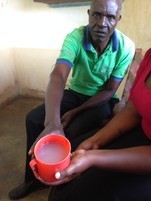'There are more medicines and diagnostic tools, but still no clean water'
15 September 2014

Malaria interventions are unlikely to improve health of communities unless the root causes of dysfunctional health systems are tackled, an ACT Consortium researcher told members of the UK Parliament.
The PRIME & PROCESS studies in Uganda showed that interventions which provide training and supplies to health centres are not enough to improve health of children in the community. Addressing political, economic and social challenges is needed to strengthen the health system and improve quality of care.
“We need a wider approach that considers health services for malaria from a holistic perspective of community health,” said PhD student Deborah DiLiberto, who presented results of the studies to the All-Party Parliamentary Group on Malaria and Neglected Tropical Diseases in Westminster.
The PRIME intervention included a number of different components to improve the quality of care for malaria at health centres.
It showed improvements, including in the way cases of malaria are managed and the way health workers interacted with patients, but these changes were small and not sustained over time.
A “drop in the ocean” of Uganda’s health system struggles
 With the world’s highest recorded incidence of malaria, Uganda faces deeply rooted health system challenges that prevent artemisinin-based combination therapy (ACT) and malaria rapid diagnostic tests (RDTs) from reaching people who need them the most.
With the world’s highest recorded incidence of malaria, Uganda faces deeply rooted health system challenges that prevent artemisinin-based combination therapy (ACT) and malaria rapid diagnostic tests (RDTs) from reaching people who need them the most.
Health workers are overloaded with work, often seeing over 100 patients in a day. Using RDTs and collecting data for the study increased these workloads.
The trial could not improve the health system support that health workers need to deliver good quality care, such as accessibility and infrastructure of health centres, staffing, regular payment of salaries, and supervision. The studies found that health workers feel a lack of respect, trust and support.
“Interventions designed for specific diseases like malaria may improve the supply of ACTs and RDTs, training on use of RDTs, and improving the collection of health data,” said DiLiberto, who studies at the London School of Hygiene & Tropical Medicine. “But there is still no clean, running water, there is still a hole in the roof, and health workers are not being supported by the system. Until the underlying challenges contributing to a dysfunctional health system are addressed, health workers and health centres may not be able to deliver good quality health care for the community.”
Images: Health worker shows water available at health centre in Uganda (credit Deborah DiLiberto); Deborah DiLiberto presents to APPMG members at Westminster (credit Débora Miranda)
Further information
- Download a policy brief of the PRIME & PROCESS studies
- Watch a video and learn more about the the PRIME & PROCESS studies
- Learn more about the All-Party Parliamentary Group on Malaria and Neglected Tropical Diseases

